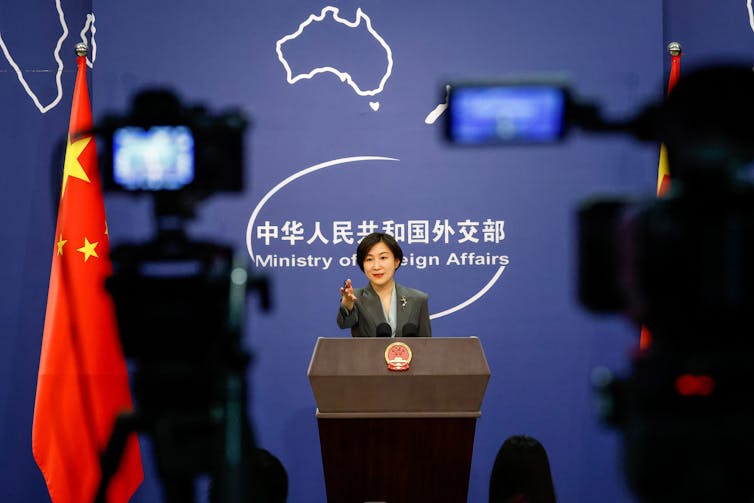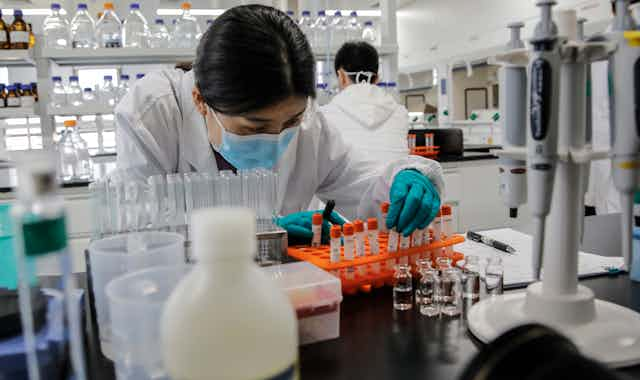China is facing renewed allegations that the COVID-19 outbreak was caused by a leak from one of their laboratories – and that this research is connected to biowarfare.
It is a question asked pretty much since the pandemic was identified: was COVID-19 a natural outbreak or a disease that escaped from a Chinese laboratory in Wuhan?
A recent report by the Sunday Times claims the newspaper has seen evidence that China was developing dangerous coronaviruses in collaboration with the Chinese military for the alleged purposes of biowarfare. This research programme was the likely source of the pandemic, the report asserts.
The allegations
The new allegations are based on “hundreds of documents” including confidential reports and memos, emails and scientific papers, as well as interviews with US State Department officials who have investigated the pandemic’s source. The report also claims that researchers from the Wuhan laboratory were taken to hospital with “COVID-like symptoms” in November 2019.
What caused COVID-19 has been investigated before, but these studies are not conclusive. The World Health Organisation (WHO) carried out an inspection in January 2021.
While their investigators could not clearly find a natural source for the disease, they also stated that suggestions COVID-19 leaked from a laboratory were “highly unlikely”. Yet the WHO said that China’s lack of transparency made the investigation difficult and that this was a reason why they could not say either way.
China still insists there is no evidence that COVID-19 came from a laboratory.
The really interesting thing about the new report is not just that it says it has new evidence, but that it claims its data shows Chinese scientists were researching coronaviruses in relation to biowarfare. Biowarfare is the deliberate use of disease and biological agents to cause harm.
A US investigator is quoted in the article as asserting that Chinese scientists were working on a vaccine. The allegation is that the Chinese military wanted a vaccine to inoculate their own population if they ever wanted to use the virus for biowarfare. With a vaccine, says the report, China “might have a weapon to shift the balance of world power”.
Claims that China was developing biological weapons have been made by Dany Shoham, a former Israeli intelligence officer and biowarfare expert. Others staunchly reject this accusation. A US National Intelligence Council report said of COVID-19: “We judge the virus was not developed as a biological weapon.”
Next steps – more data?
So, what could the rest of the world do about these new allegations – if anything?
The dispute over whether COVID-19 was created by Chinese scientists is still as hot as ever. States may feel they need more information.
We have already seen something similar happen in Syria in relation to chemical weapons, which are said to have been used during the conflict there. Despite the former US president Barack Obama having called the use of chemical weapons a “red line”, Washington said it did not wish to act until they felt the evidence of chemical warfare was incontrovertible.
Like chemical weapons, bioweapons are terrible forms of weapons of mass destruction (WMD). Yet it is precisely because these armaments are so terrible that states have to be careful. Any allegation that a country has broken the rules on WMD will be controversial. Politicians will want to, and should, be sure of the facts.
One option then is for further investigation, possibly through an international organisation such as the WHO. But this would be a difficult investigation for a number of reasons.
Investigation would not only be hard because China has yet to be fully transparent. This issue is also problematic because of dual use. Biological research doesn’t necessarily mean biowarfare. Research is also carried out for good purposes – such as medical advances. And those two types of research look much the same. So even if China were developing a vaccine, was this for public health reasons or to create defences against biowarfare attacks from others?
It is also easy to hide biowarfare research. Scientific experiments typically happen in small and secretive facilities, using equipment that can be dismantled quickly if there is any suspicion that inspectors are about to come knocking.
Options for action
What if the international community wants to take further action? States could make an official complaint that China may have violated the 1972 biological weapons convention (BWC). The convention is a legally binding treaty that prohibits the possession and use of biological weapons. The US has previously said that it “does not have sufficient information” to determine whether China has complied with the BWC.

Complaints can be made through the United Nations. In 2022, the UN Security Council denied such a complaint by Russia against Ukraine. States could appeal to the International Court of Justice, but there may be legal issues with this – especially given that not all states are signed up to the BWC. States can also call a special meeting of the BWC signatories to discuss a possible violation of the convention.
A complaint would not necessarily do much. The BWC has been widely criticised because it does not have a verification mechanism, so it has little direct authority over what states do. Making a complaint, however, would at least raise the issue at the international level.
Another potential option is the UN Secretary-General’s Mechanism for Investigation of Alleged Use of Chemical and Biological Weapons. Yet this option is shaky as it allows for investigations into the actual use of bioweapons. But even if COVID-19 were shown to be a laboratory leak this would almost certainly have been accidental and not clearly a case of biowarfare.
Ultimately, of course, another option for the international community is that they do nothing. The Sunday Times article claims to present new data, but it is not indisputable. And even merely bringing up the issue of biowarfare with China would be diplomatically contentious and ruffle a lot of political feathers.
As such, the international community will not want to take the dispute over COVID-19 forward unless they have definitive evidence of a Chinese biowarfare programme. But, given the nature of biological research, we may never be able to get that certainty.

